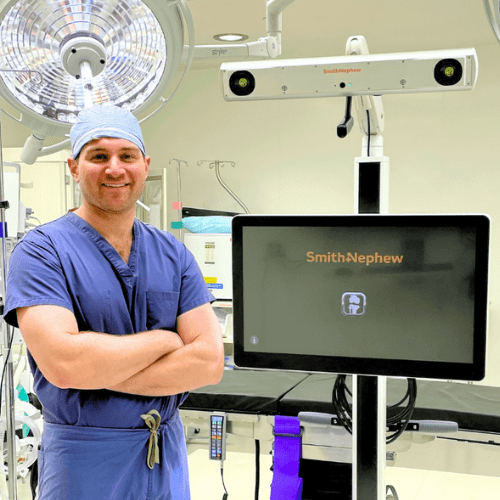by Dr. Kevin J. Choo and Dr. Jonathan L. Berliner

Hip and knee replacements are among the most commonly performed procedures in the U.S. and previously required an inpatient hospital stay. Increasingly, these surgeries are performed in outpatient settings for appropriate candidates, offering patients the convenience and safety of returning home the same day. Have you ever wondered what makes this possible? It can largely be attributed to recent medical and surgical advancements. These advancements, including new surgical approaches, modern technologies, and enhanced multimodal opioid-minimizing pain management strategies are driving the shift toward outpatient joint replacements.
Improved Surgical Techniques
There have been several advancements in surgical techniques that make outpatient joint replacement possible and safe, such as:
- Minimally invasive procedures: Smaller, specialized instruments are used to make smaller incisions, allowing for more healthy tissue to be preserved.
- Anterior approach: This muscle-sparing approach is now the preferred technique for outpatient hip replacement surgery. With this approach, the surgeon makes an incision in the front of the hip. It has been shown to increase early postoperative mobility, decrease the need for narcotic medications, and minimize the risk of some postoperative complications such as dislocation.
- Computer assisted surgery: Preoperative computer templating, intraoperative computer-navigation and robotic-assisted surgery all facilitate accuracy and consistency in component sizing and positioning. This may improve postoperative outcomes as well as implant longevity.
These surgical techniques, combined with advanced pain management strategies, lead to improved patient satisfaction and outcomes.
Improved Multimodal Pain Management Protocol
Innovative pain management strategies have played a vital role in enabling outpatient joint replacement while reducing opioid use.
Multimodal pain management involves using two or more medications to deliver pain relief through various pathways. Examples include:
- Preoperative medication: Patients are given prophylactic pain medications in the preoperative suite; proactively managing pain helps to blunt the early postoperative pain response.
- Regional anesthesia: Nerve blocks and spinal anesthesia provide targeted pain relief to specific areas, easing postoperative pain.
- Local analgesia: During the procedure, surgeons administer a series of long-lasting local anesthetic injections throughout the surgical zone.
- Postoperative pain control: Patients are given a combination of medications including acetaminophen (Tylenol), prescription-strength anti-inflammatories, muscle relaxants, and neuropathic pain medications. These medications demonstrate synergistic benefits, and their combined use allows many patients to avoid narcotic use after surgery.
These above techniques are examples of opioid-sparing strategies, which means they help minimize or eliminate the need for opioid medications. This can reduce the risks associated with opioid use including pill diversion, addiction and adverse side effects such as nausea and constipation.
Is outpatient joint replacement surgery right for you?
These advancements in surgical techniques and pain management protocol allow patients to recover in the comfort of their own homes, making outpatient joint replacement a safe and convenient option for many. Learn more about outpatient joint replacement surgery at ONS and see if you are potentially a good candidate here.
About Dr. Kevin J. Choo
Dr. Choo, Director of Hip and Knee Replacement at Greenwich Hospital, is a board-certified orthopedic surgeon who specializes in primary hip and knee replacement for the treatment of degenerative osteoarthritis, inflammatory arthritis, avascular necrosis, hip dysplasia, and post-traumatic arthrosis. He is fellowship-trained in direct anterior hip replacement, the use of computer- and robotic-assisted technology, and partial knee replacement. Dr. Choo specializes in opioid-sparing protocols, rapid recovery surgical techniques, and outpatient total hip and total knee replacements.
About Dr. Jonathan L. Berliner
Dr. Berliner, Director of the ONS Outpatient Joint Replacement Center, is a board certified orthopaedic surgeon and fellowship-trained specialist in hip and knee replacement. His expertise includes muscle sparing anterior hip replacement, minimally invasive total knee and partial knee replacement, complex revision total hip and total knee replacement, computer-assisted surgery, and trauma of the lower extremity.







